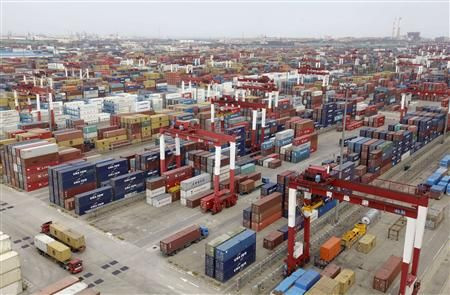Economic Data From Japan Gives Boost To Abenomics, Weak China Data Doesn't Seems To Worry Chinese Government

Rising exports, helped by a weaker yen, have been credited for rejuvenating Japan's long-stagnant economy while global powerhouse China is seen to be slowing down on many counts.
Japan, Asia’s second-largest economy, posted a strong current account surplus in April and revised GDP data for the January-March quarter, which showed the economy grew 1 percent, while bank-lending in the country recorded its highest annual growth -- 1.8 percent -- in three years.
Japan's surplus doubled to 750 billion yen ($7.70 billion) in April from a year ago, more than twice the forecast of a 310 billion yen surplus from analysts surveyed by Dow Jones Newswires and the Nikkei, data released by the Ministry of Finance showed on Monday.
The data exceeded market expectations by a huge margin and underscored a steady economic recovery, which suggests that Prime Minister Shinzo Abe’s aggressive monetary policies are beginning to have the desired effect.
The positive results come at a time when choppy trade in Japanese markets had begun to cast doubts over Abe's radical economic policies -- popularly known as "Abenomics" -- based on extensive monetary loosening, currency depreciation and fiscal expansion.
However, the road may be long for a full revival in the erstwhile economic powerhouse mired in decades of deflation.
"There isn't much change in the trade balance trend, where the weak yen is boosting import costs," Junko Nishioka, chief economist at RBS Securities Japan, told Reuters. "Exports are gradually recovering as overseas growth picks up, so that's a positive sign. But the growth in exports isn't strong enough to offset the rising import costs."
In China, which has led global growth among emerging markets for the past two decades to become the world's second-largest economy, official data released by the government on Sunday, paints a gloomy picture.
The country’s exports rose a modest 1 percent in May, way below the 7.4 percent estimated by a Bloomberg poll, following the government's sharp clampdown on fake invoicing by local exporters. In contrast, data showed that exports increased 14.7 percent annually in April.
The latest export data prompted Barclays Capital to cut China’s 2013 GDP growth forecast to 7.4 percent from 7.9 percent, and its 2014 growth forecast to 7.4 percent from 8.1 percent.
"The figures in May were weak but revealed a truer picture after regulators' move to curb fake trade deals," Zhao Xijun , a finance professor at Renmin University in Beijing, told the South China Morning Post.
China's imports were down 0.3 percent in May, which analysts believe is due to weak domestic demand that also indicates a moderation in foreign demand as most of China’s imports consist of inputs or raw material for producing finished goods for exporting.
As most economic indicators out of China have depicted disappointing trends in recent months, clamor for stimulus measures have increased from various quarters. However, economists believe that the Chinese government is less likely to follow the stimulus route followed by the U.S. and Japan to prop up their respective economies.
China's leaders, who have been revising the country's growth estimates to reflect the shift to consumer-led expansion from an export-oriented growth model, have indicated that the current rate of growth of 7.7 percent is in line with the government's expectation of 7.5 percent and that it is unlikely to loosen its policies in the near future.
President Xi Jinping and Prime Minister Li Keqiang had said earlier that the government is open to a 7 percent growth rate for the next couple of years.
"The new leaders' tolerance of economic slowdown is definitely higher than their predecessors," Zhang Yongjun, senior economist at China Centre for International Economic Exchanges, told Reuters. "They understand that China's potential growth rate has been falling. The minimum growth rate that they can tolerate has been shifted downward and it's likely to be 7 percent."
Japanese stocks responded positively to the country's encouraging economic data, with the Nikkei rising almost 5 percent on Monday to close at 13,514.2 while Japan's Topix closed at 1,111.97, up 5.2 percent. Markets in China are closed for a three-day local holiday.
© Copyright IBTimes 2024. All rights reserved.






















